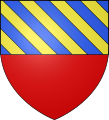Robert VII (Béthune)
Robert VII. De Bethune († November 1248 on Sardinia ) was a French nobleman of the Artois -based house Bethune . He was a younger son of Sire Guillaume II. De Béthune († 1214) and Mathilde de Dendermonde.
Since his older brother Daniel († 1226) was the heir of his father, Robert had no hope of a greater inheritance, so he became a knight in the entourage of Count Ferrand of Flanders . The House of Béthune belonged to the most influential nobility of the Artois, a former Flemish fiefdom, which, however , had to be ceded to the son of Isabella von Hainaut , the French crown prince Louis VIII. , After an eventful dispute . Count Balduin IX. von Flanders had once recognized this in the Treaty of Péronne (1198), but his son-in-law, Count Ferrand, pursued a policy to reclaim Artois, which he opposed to the French royal family. In the field of tension between these powers, the House of Béthune positioned itself on both sides. While his father and brother were loyal to their French liege lord, Robert decided on the side of the Count of Flanders.
In 1213 Robert accompanied Count Ferrand into exile in England after King Philip II of August invaded Flanders. In the same year he carried out a successful attack on the French fleet in the port of Damme together with the Earl of Salisbury , which prevented an impending invasion of England. The following year he took part in the decisive battle of Bouvines (July 27, 1214), in which King Philip II. August won the victory and captured Count Ferrand. Robert himself was captured in the battle by an opposing knight, but the latter released him immediately after he had promised to pay him a ransom. This story was passed down by an anonymous chronicler who was in Robert's service and wrote a chronicle of the French kings between 1220 and 1223 ( Chroniques des rois de France et ducs de Normandie ).
In 1226 Daniel de Béthune died without children of his own, with which Robert inherited the family property around Béthune , Richebourg and Dendermonde , as well as the hereditary office of advocatus of the church and abbey of Saint-Vaast of Arras . Obviously, in the following years he had moved closer to the French crown, because in 1236 he was named as a guarantor of the Treaty of Péronne, which he thus recognized. Earlier, Count Ferrand of Flanders had submitted to the crown in full after he was released from prison in 1227.
From his marriage to Elisabeth de Morialmez, Robert had a daughter and heiress, Mathilde († 1264), who was married in 1246 to Gui de Dampierre († 1305), a member of the Dampierre's Flemish counts . In 1248 Robert decided to participate in the crusade of King Louis IX. from France to Egypt ( Sixth Crusade ). On his ship passage to Cyprus he fell ill during a stopover in Sardinia and died. His body was transferred to Arras and buried there.
Since Gui de Dampierre rose to the rank of Count of Flanders in 1251, Mathilde linked the Béthune legacy to the Flemish county. Her son, Count Robert III. (also called Robert de Béthune), however, Béthune ceded to the crown of France in 1312.
The Béthune family continued in a branch line to this day, descended from Robert's younger brother Guillaume de Béthune, Lord of Meulebeeke.
coat of arms
literature
- Charles Emmanuel Joseph Poplimont: La Belgique héraldique: recueil historique, chronologique, généalogique et biographique complet de toutes les maisons nobles, reconnues de la Belgique , Volume 1 (1863)
- E. Warlop: The Flemish Nobility before 1300 (Kortrijk, 1975-1976)
- Pierre Bruyelle, Alain Derville: Histoire de Béthune et de Beuvry (1985)
Individual evidence
- ↑ Anonymous battle report from the Chronique des rois (English)
- ↑ Extrait d'une chronique française des rois de France par un Anonyme de Béthune , ed. by Léopold Delisle in: Recueil des Historiens des Gaules et de la France , Vol. 24, Part 2 (1904), pp. 750-775
| personal data | |
|---|---|
| SURNAME | Robert VII |
| ALTERNATIVE NAMES | Robert VII de Béthune |
| BRIEF DESCRIPTION | Lord of Béthune, Richebourg, Dendermonde etc. |
| DATE OF BIRTH | 12th Century |
| DATE OF DEATH | November 1248 |
| Place of death | Sardinia |

